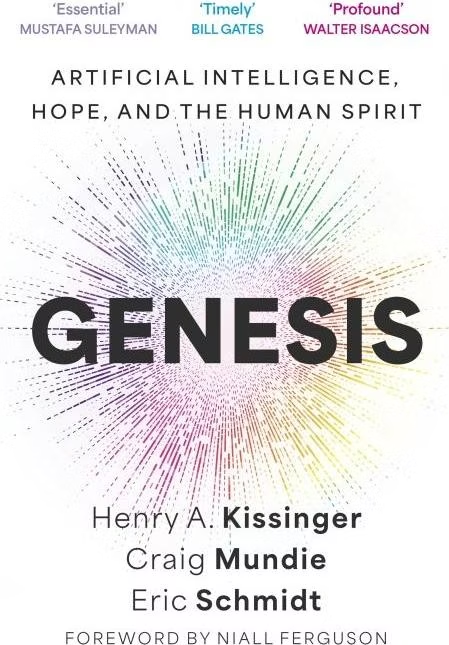- Published on
Genesis
- Authors
- Name
- Chris Oguntolu
- @chrisoguntolu
Genesis by Eric Schmidt, Henry A. Kissinger, and Craig Mundie
Artificial Intelligence, Hope, and the Human Spirit

Genesis: Artificial Intelligence, Hope, and the Human Spirit by Eric Schmidt, Henry Kissinger, and Craig Mundie was a profound and unsettling exploration that completely transformed how I think about the AI revolution we're living through. This isn't just another tech book predicting the future—it's a deep philosophical examination of what happens when machines become capable of tasks that have defined human intelligence for millennia.
What made this book so compelling was the unique perspective each author brought to the collaboration. Schmidt's Silicon Valley expertise, Kissinger's geopolitical wisdom, and Mundie's technical depth created a rare synthesis of technology, strategy, and statecraft. They don't just explain how AI works; they grapple with the existential questions it raises about human purpose, national power, and the very nature of consciousness. Their analysis of how AI will reshape everything from warfare to creativity to the concept of work felt both thrilling and deeply concerning.
The book really hit home when they discussed the "Genesis moment"—the point where AI systems begin to evolve and improve themselves without human intervention. Unlike previous technological revolutions that augmented human capabilities, they argue that AI represents something fundamentally different: machines that can think, learn, and potentially surpass human intelligence across all domains. Their exploration of how different nations are approaching AI development, particularly the strategic competition between the US and China, revealed stakes I hadn't fully grasped.
I enjoyed reading it because the authors managed to make incredibly complex concepts accessible while never losing sight of the profound implications. Their writing combines rigorous analysis with genuine humility about the uncertainties ahead. The book left me both amazed by AI's potential to solve humanity's greatest challenges and sobered by the risks of creating intelligence we might not be able to control. Overall, it was an essential and thought-provoking guide to the most important technological transformation of our time, written by three of the most qualified people to tackle such enormous questions.